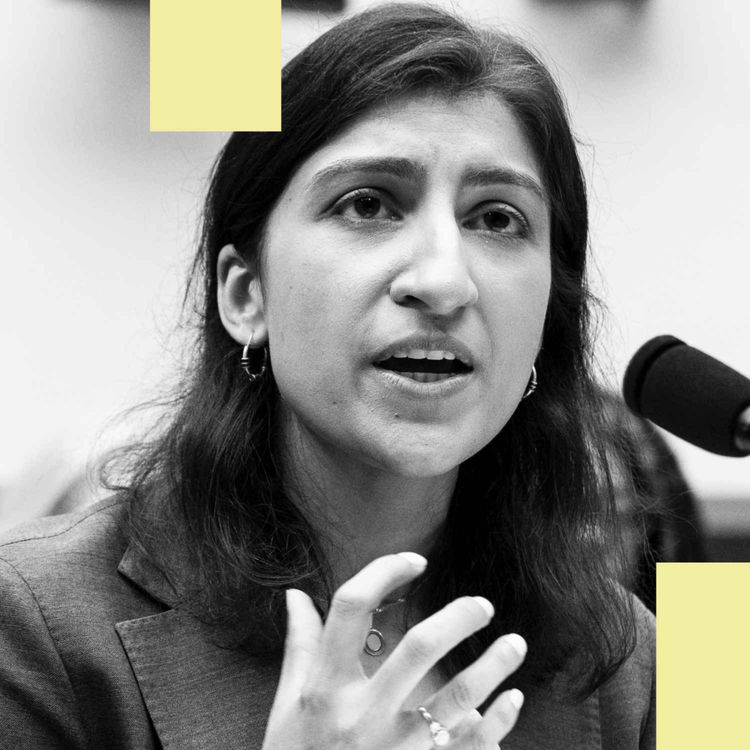Share

Deconstructed
The Feds Take Big Tech to Court
The U.S. Federal Trade Commission and 17 state attorneys general filed a antitrust lawsuit against Amazon on Tuesday. Meanwhile the U.S. Department of Justice's trial against Google is shrouded in secrecy. This week on Deconstructed, we break down the antitrust lawsuits the federal government has brought against Google and Amazon, and the anticompetitive and monopolistic practices on trial.
Ryan Grim is joined by Amanda Lewis, a partner at the law firm Cuneo, Gilbert, and LaDuca and co-founder of the Responsible Online Commerce Coalition. They are also joined by Matt Stoller, director of research at the American Economic Liberties Project and author of “Goliath: The 100-Year War Between Monopoly Power and Democracy.”
If you’d like to support our work, go to theintercept.com/give, where your donation, no matter what the amount, makes a real difference.
And if you haven’t already, please subscribe to the show so you can hear it every week. And please go and leave us a rating or a review — it helps people find the show. If you want to give us additional feedback, email us at Podcasts@theintercept.com.
More episodes
View all episodes

Intercepted: Trump and the Future of the Ukraine-Russia War
46:45|The war in Ukraine was supposed to be a short conflict. But it has been three years since Russia invaded Ukraine in 2022, killing hundreds of thousands of people and destroying huge portions of the country. Now, the Trump administration has signaled that it wants to end the war in Ukraine, but there are significant questions and deep concerns about Trump’s plans for how to end the fighting.The Trump administration has signaled it wants Ukraine to pay back the U.S. for American financial support of the war. But there are fears now that the U.S. may impose a diplomatic agreement onto Ukraine that results in crushing economic debts, damaging the country, while doing little to permanently ending the conflict..Drop Site News’ Murtaza Hussain is joined by Rajan Menon, an expert on Ukraine and a Senior Research Scholar at Columbia University’s Saltzman Institute of War and Peace Studies.Listen above or on the Drop Site channel on Apple, Spotify, RSS, or wherever you get your podcasts.
Intercepted: The Meaning of the Genocide in Gaza
44:52|During a recent press briefing alongside Israeli Prime Minister Benjamin Netanyahu, President Donald Trump floated an idea for the U.S. to take ownership of the Gaza Strip, while expelling the surviving Palestinian population from the territory.While outlandish, Trump’s statement emboldened many on the Israeli right who continue to dream of eliminating the Palestinian population of the land through forced displacement, siege, and mass killings.On the latest episode of Drop Site News’s podcast, author Pankaj Mishra joins Murtaza Hussain for a discussion on the genocide in Gaza, how various regions of the world have responded to the genocide, and the broad historical context. Mishra’s book “The World After Gaza: A History” is out now.Listen above or on the Drop Site News channel on Apple, Spotify, RSS, or wherever you get your podcasts.
Intercepted: The Civil and Proxy War Reignites in Syria
01:07:27|Joe Biden has just weeks left in his presidency. Israel’s genocidal war against Gaza is continuing at full force. In Lebanon, the so-called ceasefire was one-sided by U.S. design, meant to require only Hezbollah to cease its fire. A U.N. peacekeeping force official told CNN Tuesday that Israel had committed roughly 100 violations of the ceasefire, including gradually intensifying military strikes in southern Lebanon. After several days of Israeli attacks, Hezbollah fired back what it said was a warning to Israel. And now Israeli Prime Minister Benjamin Netanyahu is saying he is going to escalate even further.In the midst of all of this, in Syria, armed opposition forces seeking to topple the government of Bashar al-Assad stunned the region when they marched into Syria’s second largest city, Aleppo, and encountered almost no resistance from the Syrian armed forces or their allies. That operation was led by the group Hayat Tahrir al-Sham, or the Organization for the Liberation of the Levant, which the U.S. government has classified as a terror organization. HTS has its origins in ISIS and Al Qaeda, though the group’s leader Abu Mohammed al-Jolani has spent years seeking to rebrand HTS as a national liberation front that is no longer affiliated with either Al Qaeda or ISIS. While the events in Syria unfold against the backdrop of the U.S.-facilitated Israeli wars in Gaza and Lebanon, there are many factors that led to this moment in Syria. On the new episode of Drop Site News's podcast Intercepted, Aymenn Jawad Al-Tamimi, a historian who focuses on jihadist groups in Iraq and Syria, joins Jeremy Scahill for a wide-ranging discussion on the unfolding situation.This episode is a production of Drop Site News, brought to you, in part, by a grant from The Intercept. This episode was originally published at Drop Site News on December 3, 2024.
Intercepted: Lebanon's "Ceasefire" Deal With Israel, and What It Means for Gaza
01:06:09|Israeli Prime Minister and international fugitive Benjamin Netanyahu delivered a speech on Tuesday encouraging his ministers to accept a ceasefire deal with Lebanon. The truce with Lebanon, Netanyahu said, would allow Israel to rearm itself and focus on the war against Hamas and Iran. He also claimed that the U.S. had assured Israel that it would be permitted to resume its military attacks on Lebanon if Hezbollah violates the agreement.The proposed agreement between Lebanon and Israel does not include any terms requiring Israel to end its war of annihilation against the Palestinians in Gaza. Netanyahu’s cabinet voted to accept it, 10-1. Itamar Ben-Gvir, Netanyahu’s far-right minister of national security, was the sole vote against it.Throughout the day Tuesday, as the Lebanese people waited for word on whether their government would accept the deal, Israel pounded Lebanon with massive airstrikes, including fire belt bombings in the southern Beirut suburb of Dahiya.The full specifics of the proposal, which was spearheaded by the U.S. and France, have not yet been made public. In his speech announcing the agreement, President Joe Biden characterized the deal as a permanent cessation of hostilities between Israel and Hezbollah that would take hold Wednesday morning. He said Israeli forces would withdraw from Lebanon within 60 days. Biden emphasized that Israel would retain the right to attack Hezbollah if it posed any threat to Israeli security, confirming Netanyahu’s claim.Biden also said he is going to "make another push" for a Gaza ceasefire before leaving office.Lebanon's Prime Minister Najib Mikati said Tuesday evening that he welcomed the ceasefire and called on Israel to respect the terms of the agreement and to fully withdraw from Lebanese territory and cease its attacks. But as of publication, Hezbollah had not released an official statement. A senior Hezbollah official told Al Jazeera that it doubted Netanyahu’s commitment to a ceasefire and said the movement was carefully reviewing the terms of the final deal.In recent days, Hezbollah has indicated that it was open to a truce, including one that did not involve an end to the war in Gaza. “When the enemy fails to achieve its [set] goals, this means we have achieved victory,” said Sheikh Naim Qassem, the leader of Hezbollah, on November 20.On this bonus episode of Intercepted — recorded just before Biden’s speech at the White House — Jeremy Scahill speaks with Sami Al-Arian, the director of the Center for Islam and Global Affairs at Istanbul Zaim University. They discuss the emerging details of the agreement, its impact on the war against Gaza, and what to expect with Donald Trump’s imminent return to power.This episode is a production of Drop Site News, brought to you by a grant from The Intercept. This episode was originally published at Drop Site News November 26, 2024.
What Trump’s Second Term Could Mean for the Middle East
55:42|On this week's Deconstructed, the Drop Site News team gathered to discuss what we know about how Donald Trump might handle Israel and what that will mean for war with Iran; who might lead the State Department; and the broader dynamics of the Middle East.
Lever Time: Will The Cheneys Win Or Lose The Election For Dems?
01:11:39|We're sharing a special bonus episode of The Lever's flagship podcast, Lever Time, founder David Sirota and award-winning screenwriter and director Adam McKay discuss Democrats’ bid to win over GOP voters by repeatedly touting endorsements from former Vice President Dick Cheney and his daughter, former Rep. Liz Cheney. Critics say the move could alienate swing-state voters, but others say it’s a shrewd gambit to attract disaffected Republicans. McKay’s Oscar-nominated film Vice is widely considered the definitive biopic of Dick Cheney.Subscribe to Lever Time wherever you listen to podcast or visit LeverTimePod.com to hear more episodes.
Introducing Master Plan: Legalizing Corruption
04:34|This week we’re sharing an excerpt of the first episode of The Lever's new investigative series Master Plan, which was recently named a must-listen by The Guardian and Apple Podcasts.In each episode of Master Plan, The Lever’s David Sirota and his team of journalists expose the secret scheme that legalized corruption for the wealthy. With the help of never-before-reported documents, they look back at where this plot began, how it is accelerating in the 2024 election - and how it can be stopped. In this epic tale, you’ll learn things you never knew about icons like President Richard Nixon, Senator Mitch McConnell, Fox News founder Roger Ailes, and Supreme Court justices John Roberts and Samuel Alito. You’ll learn how their master plan to legalize corruption affects you and your family - and undermines American democracy today. Listen now to the full first episodes of Master Plan and subscribe wherever you get your podcasts.
23. Project 2025 Roots Date Back Half a Century
35:47||Season 11, Ep. 23More than 50 years ago, lawyer Lewis Powell penned a letter to the U.S. Chamber of Commerce arguing that the American business community must take political power and must use it "aggressively and with determination — without embarrassment and without the reluctance." President Richard Nixon would go on to appoint Powell to the U.S. Supreme Court. This week on Deconstructed, Ryan Grim speaks to David Sirota about his new investigative podcast series, Master Plan, that examines how corporate corruption took root in American politics.Transcript coming soon.
REBROADCAST PLUS Price Controls: An Inflation Solution That Doesn’t Screw Workers
46:27|On Friday, Vice President Kamala Harris delivered a speech in North Carolina outlining her economic platform, including a federal ban on price gouging, expanded tax credits, and more. The proposal to tackle corporate price gouging has sparked significant pushback from both the establishment wing of the Democratic Party and various factions within the Republican Party. About a year ago, we spoke with economist James Galbraith on the back porch of his Vermont childhood home, where he was raised by John Kenneth Galbraith—one of the 20th century's leading policymakers and thinkers on government regulation of prices. Today, we’re revisiting that conversation, which originally aired on July 7, 2023.James K. Galbraith is a professor of government and business relations at the University of Texas at Austin. Galbraith has an extensive history of working in government, including as executive director of the Joint Economic Committee of the U.S. Congress and an economist for the House Banking Committee. Galbraith joins Ryan Grim to discuss the implementation of price controls by the U.S. government, how it brings down prices, how the Biden administration has used it and could use it more, and how Galbraith’s father — economist and politician John Kenneth Galbraith — was instrumental in setting price controls during World War II.